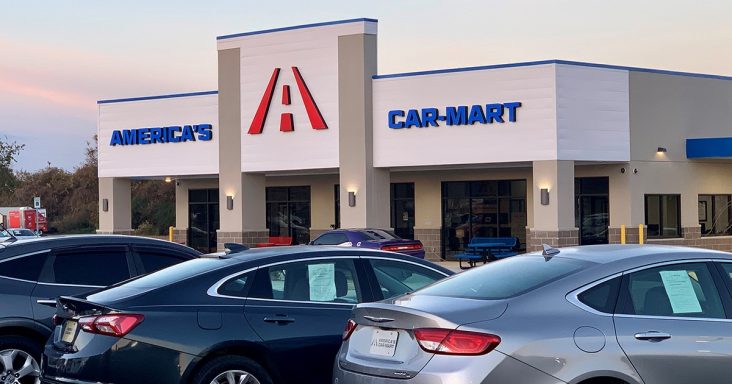America’s Car-Mart reports mixed Q4 results; earnings plunge, but revenue surges
by May 24, 2023 11:37 am 1,084 views

Rogers-based America’s Car-Mart posted double-digit declines in earnings but double-digit increases in revenue for the fourth quarter of fiscal 2023 and the year amid low inventories and high prices of used vehicles. The buy here, pay here used car dealer missed earnings estimates but beat revenue expectations.
Before the markets opened Wednesday (May 24), Car-Mart reported earnings fell by 92.1% to $2.07 million, or 32 cents per share, in the quarter ending April 30 from $26.38 million, or $3.97 per share in the same period last year. Revenue rose by 12.2% to $388.31 million from $346.23 million.
Car-Mart missed expectations of $1.13 per share in the fourth quarter, based on a consensus of three analysts. The company beat revenue estimates of $352.87 million.
For the year, earnings declined by 78.5% to $20.39 million, or $3.11 per share, from $94.97 million, or $13.92 per share. Revenue rose by 17.6% to $1.4 billion from $1.19 billion.
The company missed earnings estimates of $3.85 per share, based on a consensus of three analysts. It beat revenue estimates of $1.34 billion.
In a report on Car-Mart’s earnings, equity analysts Kyle Joseph and John Hecht and equity associate Derek Sommers, all of Jefferies, attributed Car-Mart’s earnings decline to higher provision and interest expense, partially offset by sales that exceeded expectations.
In the fourth quarter, vehicle sales rose by 7.5% to 17,655 from 16,426 in the same period last year. The average retail sales price rose by 3.5% to $18,133 from $17,519. Same-store revenue growth fell to 12% from 23.4%. The number of operating dealerships rose by 1.3% to 156 from 154. Dealership sales volumes rose to a record of 37.7 vehicles per month. Within three years, Car-Mart expects the volumes to rise to between 40 and 50 vehicles. Long-term, the company expects to support at least 1,000 customers per dealership. More than half of its sales can be attributed to repeat buyers.
Also in the fourth quarter, net charge-offs rose to 6.3% from 5.1%. Accounts over 30 days past due rose to 3.6% from 3%. Existing loans increased by 7.6% to 102,305 from 95,107. The average contract term rose by 7.9% to 46.3 months from 42.9 months. In December, Car-Mart increased the contract interest rate from 16.5% to 18%.
For the year, vehicle sales rose by 4.9% to 63,584 from 60,595 last year. Net finance receivables rose by 24.3% to $1.07 billion from $863.67 million.
“We are currently at a unique time with an unprecedented number of factors impacting both our industry and our company,” Car-Mart CEO Jeff Williams said. “While we face certain challenges – which we feel are primarily short-term – the opportunities in front of us have never been greater. Ongoing disruption in the used car market challenges us to purchase quality vehicles at affordable prices.
“Our customers face higher living costs due to persistent inflation, higher interest rates, and higher fuel and rent expenses. In response to these challenges, we have had to extend our contract terms to keep payments affordable; however, we still face less favorable customer payment behavior and lower gross profit margin. On the other hand, major competitors are shutting their doors.”
In a conference call, Car-Mart President Doug Campbell explained that the closure of two competitors operating in the Southeast has eased vehicle procurement pressures and provided a growth opportunity there.
“Given low industry inventories, vehicle wholesale prices had a sharp seasonal uptick of 6-7% during the quarter,” Williams said. “Since the bulk of our procurement activity was completed early in the period, our retail prices did not increase to the same extent. Wholesale prices have begun to soften but remain high by historical standards. We expect affordability to improve gradually over the next couple of years with continuing strong wage increases for our customers. Automobile credit terms and conditions are tightening, and we expect to attract higher credit-rated customers.
“Lastly, and perhaps most excitingly, we have nearly completed the extensive long-term investments we have made over the past several years,” Williams added. “These include the loan origination system (LOS), enterprise resource planning (ERP) and customer relationships management (CRM) software implementations, wholesale efforts, facility improvement and refurbishment projects. We believe these investments will enable us to operate efficiently and at scale, ultimately leading to higher long-term returns for our shareholders.”
Shares of Car-Mart (NASDAQ: CRMT) were trading mid-morning Wednesday at $80, down $9.31 or 10.43%. In the past 52 weeks, the stock has ranged between $52.24 and $127.05.
BROADER TRENDS
In a mid-May presentation on the used vehicle market, Jeremy Robb, senior director of economic and industry insights at Cox Automotive, said wholesale vehicle values declined by 2.1% in the first half of the month from April. He noted that a decline is normal for this time of the year. Values are also down by 7% from May 2022.
Used retail prices are down by about 5% from May 2022 but have been rising since early spring, Robb said. Prices remain above levels in 2021 and previous years.
Robb said used inventories at dealerships are down by 16% from last year. Days supply of vehicles is at 43.9 days, down 13% from last year.
Used vehicle retail sales also have decreased so far this month after rising at the end of April, said Robb, adding that rising interest rates have put a strain on the consumer. Also, economic uncertainty has led people to delay purchases.
“If we were to see the U.S. default sometime in early June, that would likely push us into a recession,” said Jonathan Smoke, chief economist at Cox Automotive. “At the very least, we are going to see a negative impact on consumer confidence that will likely slow consumer spending – at least in the short term.”
